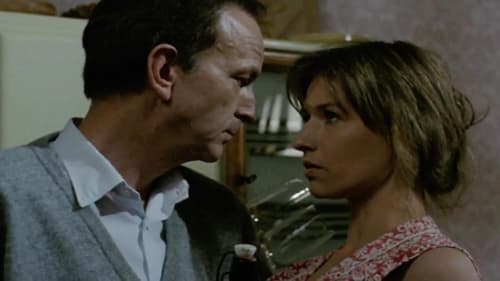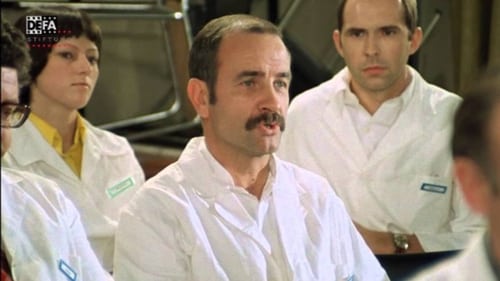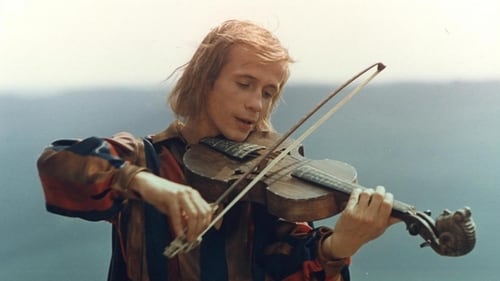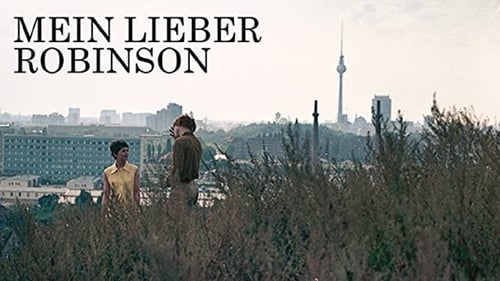Roland Gräf
Birth : 1934-10-13, Meuselbach, Germany

Screenplay

Director

Screenplay
Winter 1968. Historian Dr. Dallow is released from prison. He is still trying to cope with and understand why he was put behind bars for 21 months for defamation of the state. His supposed "crime:" for five minutes he accompanied a cabaret chanson on the piano. The film shows what "ordinary socialism" was like, letting the audience feel the threat under which the people in the GDR had to live over many years.

Director
Winter 1968. Historian Dr. Dallow is released from prison. He is still trying to cope with and understand why he was put behind bars for 21 months for defamation of the state. His supposed "crime:" for five minutes he accompanied a cabaret chanson on the piano. The film shows what "ordinary socialism" was like, letting the audience feel the threat under which the people in the GDR had to live over many years.

Director of Photography
Three people from very different walks of life meet at a large construction site. Young, unmarried, self-confident construction manager Linda Hinrichs dedicates herself completely to her work and enjoys living more independently then most women. Daniel, a student works on the construction site to make money during his summer holiday, and impresses Linda with his spontaneous energy and idealism. Brigadier Böwe, an older, divorced man works his way from one construction site to the other and has lost his own personal happiness on the path to developing what was seen as officially suitable social standards. Both men try to win Linda over, not realizing that they are taking her freedom away from her.

Writer
This biographical film is set in 1937, with Fallada suffering the effects of living under a microscope. The film details his decline, as he is intermittently imprisoned and threatened in order to motivate him to write for the Fatherland. Even the attention of his kind, patient wife and loving children begin to feel oppressive to him. This is one of the few films to take a serious, in-depth look at the tribulations of a creative artist pulled in all different directions by the real world.

Director
This biographical film is set in 1937, with Fallada suffering the effects of living under a microscope. The film details his decline, as he is intermittently imprisoned and threatened in order to motivate him to write for the Fatherland. Even the attention of his kind, patient wife and loving children begin to feel oppressive to him. This is one of the few films to take a serious, in-depth look at the tribulations of a creative artist pulled in all different directions by the real world.

Writer
1942. The members of the Voß family, mother, two daughters, a daughter-in-law, and a son-in-law, are living in a house at the river. A fellow soldier of son Paul, who fights at the eastern front, delivers his greetings and an embroidered Russian blouse for Emmi, Paul′s wife. Daughter Agnes, whose husband is also fighting in the war, receives a fur vest from the junior partner who is stalking her. Obviously, the vest is also loot from the eastern front. When the family receives news that Emmi′s husband has been killed in action, the war finally enters the house at the river. Emmi commits suicide while Agnes′s husband returns as a cripple from the war front. At home, he has to learn what a price his wife had to pay for the "Russian fur".

Director
1942. The members of the Voß family, mother, two daughters, a daughter-in-law, and a son-in-law, are living in a house at the river. A fellow soldier of son Paul, who fights at the eastern front, delivers his greetings and an embroidered Russian blouse for Emmi, Paul′s wife. Daughter Agnes, whose husband is also fighting in the war, receives a fur vest from the junior partner who is stalking her. Obviously, the vest is also loot from the eastern front. When the family receives news that Emmi′s husband has been killed in action, the war finally enters the house at the river. Emmi commits suicide while Agnes′s husband returns as a cripple from the war front. At home, he has to learn what a price his wife had to pay for the "Russian fur".

Writer

Director

Screenplay
On a forest road in the Brandenburg March, village teacher Potsch accidentally encounters the distinguished Professor Menzel, who got stuck there in his car. In the conversation that ensues, Menzel and Pötsch quickly discover that they both are great admirers of the early 19th-century writer Max von Schwedenow who was born in the area.

Director
On a forest road in the Brandenburg March, village teacher Potsch accidentally encounters the distinguished Professor Menzel, who got stuck there in his car. In the conversation that ensues, Menzel and Pötsch quickly discover that they both are great admirers of the early 19th-century writer Max von Schwedenow who was born in the area.

Writer
When he reaches age 18, Peter is released from the children's home where he grew up, but this does not mean he is truly ready for adult life.

Director
When he reaches age 18, Peter is released from the children's home where he grew up, but this does not mean he is truly ready for adult life.

Screenplay
When Dr. Schmith's proposal for international research on infant mortality is rejected, he decides to leave East Germany and strikes a deal with an escape agency that promises him a leading position at a children's hospital in West Germany. But then the decision is reversed: the project is approved and his international colleagues want Dr. Schmith to head the GDR section. Moreover, he falls in love with his new colleague, Katharina. Schmith initially tries to ignore the arrangements he made with the escape agency, but they blackmail him. Things soon turn deadly...

Director
When Dr. Schmith's proposal for international research on infant mortality is rejected, he decides to leave East Germany and strikes a deal with an escape agency that promises him a leading position at a children's hospital in West Germany. But then the decision is reversed: the project is approved and his international colleagues want Dr. Schmith to head the GDR section. Moreover, he falls in love with his new colleague, Katharina. Schmith initially tries to ignore the arrangements he made with the escape agency, but they blackmail him. Things soon turn deadly...

Director
For thirty years, Karl Achilles has been working at the chemical collective in Bitterfeld. But now his last day as a master at the plant has come. He is about to retire; even if Karl, who finds ending his working life difficult, wanted to stay on, it would not be possible. Karl’s colleagues have arranged a farewell dinner for the retiring master at an outdoor restaurant. But on his last day of work, before the farewell dinner, he meets all sorts of people: both colleagues and people, who do not work at the plant. A mosaic of the biography of a person who found fulfilment in his work and now has to look for the meaning of his life anew.

Director of Photography
The King of Malabunt has won another war, after decorating himself and his three wooden marshals, he dismisses his army with a low wages. One of his soldiers protest this and is thrown into jail, but he swears to someday return and take all the wealth of the king.

Writer
19-year old Peter is working to gain practical experience for his planned medical studies. But his life turns into confusion as he unexpectedly comes a father.

Cinematography
19-year old Peter is working to gain practical experience for his planned medical studies. But his life turns into confusion as he unexpectedly comes a father.

Director
19-year old Peter is working to gain practical experience for his planned medical studies. But his life turns into confusion as he unexpectedly comes a father.

Cinematography
The story of a young, idealistic doctor and his on-the-job training as a rookie surgeon. Dr. Heiner Sommer moves to a small town in the GDR where he will complete his training under the senior physician, also named Dr. Sommer.

Director of Photography
Long-haul driver Hannes (Manfred Krug) picks up a young hitchhiker, Herb (Jaecki Schwarz), who had a falling-out with his parents after dropping out of college and now travels around doing odd jobs. After a series of adventures, they are joined by Johanna (Jutta Hoffmann) and her child, who missed their bus and need a ride to Berlin. Johanna has left her husband so that he can reflect on their broken relationship and both men gradually begin to fall in love with her.

Cinematography
Dr. Barbara Heim, a heart surgeon, and Gunter Heim, a well-known actor, have been married for seven years. They have a six-year-old daughter. Both partners are totally taken up by their work which is physically and mentally demanding. So there is little time left for family life and the strained relations worsen and finally plunge Barbara into a crisis - shortly before their seventh wedding anniversary. At this very point a child dies in hospital, prompting Barbara to ask herself in desperation if - and for how long she can put up with the double burden of career and family. On top of this, she notices that Gunter is starting to compare her to other women.

Cinematography
Karin, who is in her mid-thirties, works as registrar but has been divorced for several years. Together with her 16-year old daughter Nora, she leads a happy and independent life. Then, she finds a new partner in the mathematician Peter, but does not tell her daughter about him. When Peter proposes marriage, Karin always comes up with new excuses why such a step is still too early for her. She mainly fears that Nora would not be able to cope with another marriage of her mother. But when Peter cannot be dissuaded anymore by her excuses and finally wants to marry her, Karin comes up with a bizarre plan.

Director of Photography
Originally banned in 1966, East German director Jürgen Böttcher's tale of love and disillusionment among two newlyweds attempting to navigate the treacherous world of marriage was never officially released in his homeland until after reunification in 1990.

Cinematography

Director of Photography

Cinematography
Film by Wolfgang Bartsch.





















